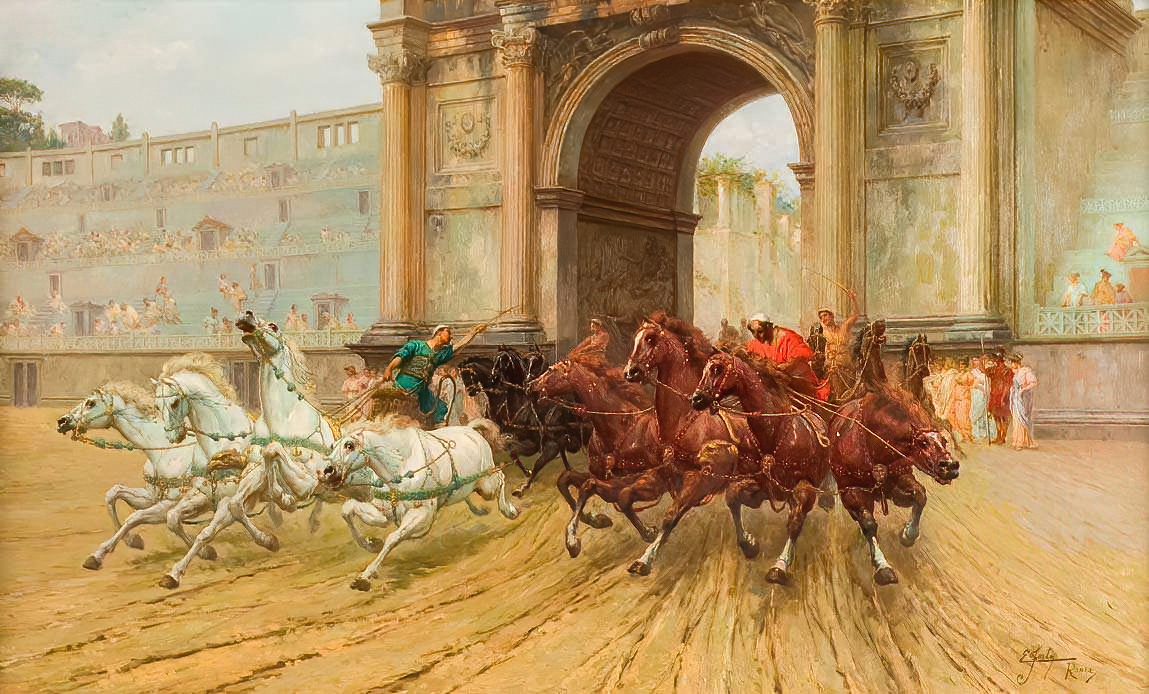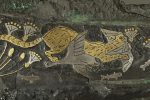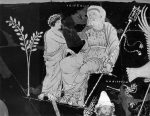Every September the Romans celebrated the Ludi Romani, one of their most ancient and important festivals. Held in honour of Jupiter, the games, also known as the Ludi Magni, coincided with the anniversary of the dedication of the Capitoline Temple of Jupiter Optimus Maximus on the Ides (13th) of September 509 BCE.
According to Livy, the Games were already established by the time of Tarquinius Priscus, the fifth king of Rome (late 7th to early 6th century BCE), who increased their scale and splendour following a pleasing victory, and, being Etruscan himself, introduced elements from his own culture:
[Tarquinius] bellum primum cum Latinis gessit, et oppidum ibi Apiolas vi cepit, praedaque inde maiore quam quanta belli fama fuerat revecta, ludos opulentius instructiusque quam priores reges fecit. tum primum circo qui nunc maximus dicitur designatus locus est. loca divisa patribus equitibusque ubi spectacula sibi quisque facerent; fori appellati. spectavere furcis duodenos ab terra spectacula alta sustinentibus pedes. ludicrum fuit equi pugilesque, ex Etruria maxime acciti. sollemnes deinde annui mansere ludi, Romani magnique varie appellati.
Livy, Ab Urbe Condita, 1.35
His first war was with the Latins, whose town of Apiolae he took by storm. Returning thence with more booty than the rumours about the war had led people to expect, he exhibited games on a more splendid and elaborate scale than former kings had done. It was then that the ground was first marked out for the circus now called Maximus. Places were divided amongst the Fathers and the knights where they might each make seats for themselves; these were called ‘rows.’ They got their view from seats raised on props to a height of twelve feet from the ground. The entertainment was furnished by horses and boxers, imported for the most part from Etruria. From that time the Games continued to be a regular annual show, and were called variously the Roman and the Great Games.
(trans. B.O. Foster, Loeb 1919, slightly adapted)
Dionysius of Halicarnassus (circa 60 BCE-7 BCE), citing Fabius Pictor as his source, gives us the following account of the Pompa, the procession with which the Ludi Romani began:
πρὶν ἄρξασθαι τῶν ἀγώνων, πομπὴν ἔστελλον τοῖς θεοῖς οἱ τὴν μεγίστην ἔχοντες ἐξουσίαν, ἀπὸ τοῦ Καπιτωλίου τε καὶ δι᾽ ἀγορᾶς ἄγοντες ἐπὶ τὸν μέγαν ἱππόδρομον. ἡγοῦντο δὲ τῆς πομπῆς πρῶτον μὲν οἱ παῖδες αὐτῶν οἱ πρόσηβοί τε καὶ τοῦ πομπεύειν ἔχοντες ἡλικίαν, ἱππεῖς μέν, ὧν οἱ πατέρες τιμήματα ἱππέων εἶχον, πεζοὶ δ᾽ οἱ μέλλοντες ἐν τοῖς πεζοῖς στρατεύεσθαι· οἱ μὲν κατ᾽ ἴλας τε καὶ κατὰ λόχους, οἱ δὲ κατὰ συμμορίας τε καὶ τάξεις ὡς εἰς διδασκαλεῖον πορευόμενοι· ἵνα φανερὰ γίνοιτο τοῖς ξένοις ἡ μέλλουσα ἀνδροῦσθαι τῆς πόλεως ἀκμὴ πλῆθός τε καὶ κάλλος οἵα τις ἦν. τούτοις ἠκολούθουν ἡνίοχοι τὰ τέθριππά τε καὶ τὰς συνωρίδας καὶ τοὺς ἀζεύκτους ἵππους ἐλαύνοντες· μεθ᾽ οὓς οἱ τῶν ἀθλημάτων ἀγωνισταὶ τῶν τε κούφων καὶ τῶν βαρέων τὸ μὲν ἄλλο σῶμα γυμνοί, τὸ δὲ περὶ τὴν αἰδῶ καλυπτόμενοι.
Dionysius of Halicarnassus, Roman Antiquities, 7.72
Before beginning the games the principal magistrates conducted a procession in honour of the gods from the Capitol through the Forum to the Circus Maximus. Those who led the procession were, first, the Romans’ sons who were nearing manhood and were of an age to bear a part in this ceremony, who rode on horseback if their fathers were entitled by their fortunes to be knights, while the others, who were destined to serve in the infantry, went on foot, the former in squadrons and troops, and the latter in divisions and companies, as if they were going to school; this was done in order that strangers might see the number and beauty of the youths of the commonwealth who were approaching manhood. These were followed by charioteers, some of whom drove four horses abreast, some two, and others rode unyoked horses. After them came the contestants in both the light and the heavy games, their whole bodies naked except their loins.
(trans. Earnest Cary, Loeb 1943)
Caesar, Cassius Dio, and the politics of spectacle
Although initially these Games lasted only a day or two, by the time of Augustus they ran from 4th to 19th September.
Putting on lavish games was a well documented means of currying public favour, and Cassius Dio describes how the Ludi Romani were exploited by Caesar for political influence:
… τοῦτο μόνον ἐν τῇ ἀγορανομίᾳ ἐπῃνέθη, ἀλλ’ ὅτι καὶ τὰ Ῥωμαῖα καὶ τὰ Μεγαλήσια πολυτελέστατα ἐποίησεν, ἔτι δὲ καὶ μονομάχων ἀγῶνας ἐπὶ τῷ πατρὶ μεγαλοφρονέστατα διέθηκεν. ἐγένετο μὲν γὰρ τῶν δαπανηθέντων ἐς αὐτὰ τὰ μὲν κοινῇ αὐτῷ πρὸς τὸν συνάρχοντα Μᾶρκον Βίβουλον, τὰ δὲ καὶ ἰδίᾳ· τοσοῦτον δὲ δὴ ἐν τούτοις ὑπερῆρεν ὥστε καὶ τὴν ἐπ’ ἐκείνοις δόξαν ὑφετερίσασθαι καὶ δοκεῖν ἅπαντα αὐτὸς ἀ νηλωκέναι. ὁ οὖν Βίβουλος αὐτὸς ἐπισκώπτων ἔλεγεν ὅτι τὸ αὐτὸ τῷ Πολυδεύκει πεπονθὼς εἴη· τοῦ γάρ τοι ναοῦ κοινοῦ οἱ πρὸς τὸν ἀδελφὸν τὸν Κάστορα ὄντος, ἐπ’ ἐκείνου μόνου ἡ ἐπωνυμία αὐτοῦ γίγνεται.
Cassius Dio, Roman Histories, 37.8
… Not for this alone did Caesar receive praise during his aedileship, but also because he exhibited both the Ludi Romani and the Megalenses (another major Roman Games, lasting for a week in April) on the most expensive scale and furthermore arranged gladiatorial contests in his father’s honour in the most magnificent manner. For, although the cost of these entertainments was in part shared jointly with his colleague Marcus Bibulus, and only in part borne by him individually, yet he so far exceeded Bibulus in his expenditure on the latter as to gain for himself the credit for the former too, and was thought to have borne the whole cost himself. Even Bibulus accordingly joked about it, saying that he had suffered the same fate as Pollux; for, although that hero possessed a temple in common with his brother Castor, it was named after the latter only.
(trans. Earnest Cary, Loeb 1914, slightly adapted)
Games, gods, and empire: why the Ludi Romani endured
The enduring presence of the Ludi Romani across centuries of Roman history was no accident. These Games were far more than entertainment—they were a ritualised assertion of divine favour and national identity. Celebrated in honour of Jupiter Optimus Maximus, they served as a reaffirmation of Rome’s foundational myths, its military triumphs, and its status as a city destined for greatness. From the early monarchy through the Republic and into the Imperial era, successive generations of Roman leaders understood the political power of spectacle. The Games were an opportunity to honour tradition while displaying wealth, generosity, and piety to the public.
But the Ludi Romani also offered a shared cultural language—both sacred and civic—that helped hold a vast, multi-ethnic empire together. To understand the nuance of these festivals, from the symbolism of the Pompa to the oratory of the magistrates presiding over the events, one must turn to the words themselves. This is one of many reasons why students today choose to learn Latin: not simply to read about Roman life, but to enter it on its own terms.
Ludus of course is also the Latin word for ‘school’. At the start of this new academic year, we hope you are enjoying ludi of whatever kind!



